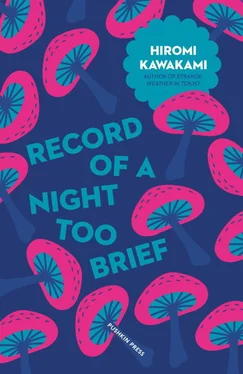“Let’s have a drink. Why not, once in a while?”
She sat herself down in the chair next to me.
At her prompting, I raised my glass, took a sip, and, finding myself suddenly very thirsty, drained it to the last drop. I waited to see if she’d fill it up again, but she didn’t. Did she know I don’t like it when people try to pour for me?
“Aah, that tastes good!” the woman exclaimed as she finished her glass and proceeded to refill it. Seeing this, I refilled mine, and just like that, the bottle was empty.
“There are another two bottles chilling,” she said, transferring some dumplings to her bowl with her chopsticks. She started tucking into them.
With uneasiness, I did the same—since they did look rather delicious. The slightest squeeze of the chopsticks made the dumplings ooze with juice, so I popped a whole one straight into my mouth. The taste was just like one of my own. After polishing off another dumpling, I drank some beer, then ate some beans, and then had another gulp of the beer. But I couldn’t bring myself to touch the sashimi . The thought of raw fish prepared by a snake was simply too creepy to take.
The woman quickly worked her way through the sashimi , swabbing each slice with wasabi and soy sauce.
“You’re home late today,” she observed.
“We drove to Kōfu.”
I hadn’t meant to engage. My defences must have been down because of the drink. Then, immediately, “What are you?” I asked.
“Ah. I’m your mother, Hiwako, dear,” she said.
“Huh?”
The woman had said she was my mother as if it was the most natural thing in the world, and now, going to the refrigerator, she took out a second bottle of beer. She tapped the cap, opened the bottle and filled her glass and mine to the same level, creating thick heads of foam.
My mother was still alive, living in my home town of Shizuoka. Likewise my father. I had two younger brothers. One brother was enrolled in the local college; the other was still at high school. My mother had a typically Japanese face—she looked a bit like that actress, whose name escapes me, the one who often plays mothers in TV dramas. The woman sitting in front of me, however, had a much more angular, Western face. Her eyelashes were terribly long. She had high cheekbones, and the tiny wrinkles around her mouth and eyes accentuated her rather sharp features.
Suddenly concerned about my mother in Shizuoka, I stood up and picked up the telephone to call home. I couldn’t remember the number, and twice dialled it incorrectly. It was like one of those dreams when you’re desperately making a phone call but you’re all thumbs.
“Hello?” On the third try I got my mother on the other end.
“Hiwako, dear!” she exclaimed, when she realized who was calling.
“Hi.”
“What’s the matter?”
“Nothing. I wondered… if you’re OK.”
“Oh, we’re fine. And you?”
“I’m OK.”
“Is something wrong?”
As I’m not particularly fond of the telephone anyway, I rarely call home, except on the occasional Sunday. My family knows I don’t like it, so our conversations last two minutes.
“Dad and everyone doing OK?”
“Not too bad. Same as always, you know. What’s the matter?”
“Nothing. I just…” I managed to mumble a few words more, then hung up.
The woman had taken no notice as I talked, and carried on munching food and tossing down her drink.
When I returned to the table, nearly all the food was gone. The woman was sitting, chin in hand, elbow propped on the table, and on the third bottle of beer.
“Hiwako, dear, why did you give up being a teacher?” she asked, sipping her beer, without directing her chopsticks at any of the plates.
With my mother’s voice still ringing in my ears, I was wide open to the question. The situation still struck me as weird, but I resigned myself to having to answer.
“I couldn’t get into it.”
“Into what?”
“Teaching.”
“Is that all?”
I didn’t reply.
“That’s not the real reason, is it?”
“Maybe not.”
“What was the real reason?”
The woman drank some more beer, and again refilled her glass. Her arm had come out in goosebumps, and the flesh looked dry and white.
“Maybe I was burnt out.”
My students didn’t ask all that much of me in the class-room, but more often than not I would get the feeling that they must require something, and I would give them something that turned out not to be what they wanted at all. Then I would get into a muddle about whether I had needed to foist it on them . That’s what burnt me out. The whole thing was a charade.
“Well,” the woman announced suddenly, “time to hit the sack,” and then, without bothering to clear away any of the dirty dishes, she pressed herself against the wooden post in a corner. How she did it I’ll never know, but she managed to flatten herself out completely, wind herself against the surface of the wood, and slither round up to the very top. Once she reached the ceiling, she stopped, and, when I looked at her a second later, she was a snake. Looking just like an image that someone had painted of a snake curled up there, she closed her eyes.
After that, she didn’t budge, and nothing I did—calling up at her, even bringing a long stick and giving her a poke with it—had any effect.
The next morning, the snake was still there, in the same spot. I wondered if I wasn’t being a bit reckless, but I decided to leave her as she was, and set off to work.
When I arrived, Mr Kosuga was standing outside raising the shutter. I could hear a sound like gunshots in the near distance.
“Bird-scaring rockets,” Mr Kosuga said, before I’d even said a thing about the noise. “Do you know about bird-scaring rockets, Miss Sanada?”
“No,” I said, and he proceeded to give me an explanation.
Bird-scaring rockets, Mr Kosuga explained, are a kind of device—like guns but without bullets—that produce loud bangs, used by farmers to deter unwanted animal visitors from the rice paddies. They are about eighty centimetres long.
“When we first set up shop, we had wild boars coming out of the forest. We’d hear shots all the time. It was like a full-blown battle raging. Huge bangs going off in the early morning.”
He told me, chuckling, that for a time after he and Nishiko arrived in the area, whenever he heard the sound, he’d think her ex-husband had come after them and was taking potshots at him. Brought up in the city, he wasn’t used to the noise.
And that was three years after Nishiko had left her Kyoto home, Mr Kosuga added. He left the filterless cigarette in his mouth unlit.
“I assumed it was some sort of practice,” I told him.
Mr Kosuga looked puzzled.
“The Self-Defence Forces,” I added.
“Ohhh,” he mouthed. The cigarette, stuck to his upper lip, made an upward movement in tandem.
“Practice. Training. For battle,” he said. “Yes, I see.” He went on: “You can’t be too careful.”
Unsure how I ought to respond, I just looked off to one side slightly.
Mr Kosuga started singing some sort of song, in a nasal tone.
You can’t be too careful…
Keep hold of the things you love…
Safe in our deposit box…
The song seemed somehow familiar.
The bird-scaring rockets went off faintly in the distance.
When I went inside the shop, the air still had a chill about it. There was no sign of Nishiko. Every so often she didn’t come in, and today was probably one of those days. Her big toe was probably acting up. Nishiko suffered from gout.
I dusted the items on the shelves, and sprinkled water over the pavement in front of the shop, carrying out Nishiko’s daily tasks. Then, rather than coffee, since that would be encroaching too much, I made green tea for two, sat down in front of the desk, and with nothing else to do, just sipped my tea.
Читать дальше

![Хироми Каваками - Strange Weather in Tokyo [= The Briefcase]](/books/29150/hiromi-kavakami-strange-weather-in-tokyo-the-br-thumb.webp)



![О Генри - Недолгий триумф Тильди [The Brief Debut of Tildy]](/books/415353/o-genri-nedolgij-triumf-tildi-the-brief-debut-of-thumb.webp)






